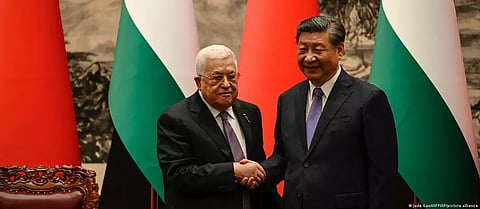

By Dang Yuan
WASHINGTON: Standing on the banks of the Huangpu river in China’s financial capital Shanghai, one cannot miss the Peace Hotel, a tall building with a green copper roof that overlooks the surrounding areas. The hotel has hosted state guests such as US Presidents Ronald Reagan and Bill Clinton as well as stars like Charlie Chaplin and George Bernard Shaw. What is less well known is that the building — built by the Jewish businessman Victor Sassoon in 1929 — was called the Cathay Hotel until 1949. It was the tallest building in the city for several years. Sassoon moved to Shanghai in the 1920s and built up a business empire there. During World War II, he supported the building of a settlement of around 2.5 square km, where around 20,000 European Jews fleeing Nazi persecution found protection.
But after the war and the seizure of power in China by the communists, most Jews left Shanghai. Victor Sassoon was forced to sell his companies to the Chinese Communist Party for a pittance. The Sassoon case highlights the disdain with which the communists treated the Jews and, later, the then newly formed state of Israel. During the Cold War, China always declared solidarity with its Arab allies and often voted against Israel at the United Nations. Indeed, it was not until 1992 that China and Israel officially established diplomatic relations. Since establishing formal diplomatic ties, China has viewed Israel primarily as a trading partner. Both sides have traded goods worth about $22 billion so far this year.
Israeli Prime Minister Benjamin Netanyahu was due to travel to China in October 2023 and the conclusion of a free trade agreement between the two sides was high on the agenda. Official documents from both countries focus mostly on the economy and trade. They rarely mention the conflict in the Middle East. The official statement following Netanyahu’s last visit to Beijing in 2017, for instance, merely stated that China wanted to promote joint innovations with Israel and support high-tech start-ups. China always views Israel via prism of its ties to the US, Beijing’s geopolitical rival. Zhang Jun, China’s ambassador to the UN who took over the chairmanship of the UN Security Council in November, said: “China solemnly calls on a certain major country, with special influence on the parties concerned to, put aside its self interests and geopolitical considerations, and make every effort to stop the war and restore peace.”
Zhang was referring to the US, which he implicitly accused of having an interest in the ongoing war. “Israel is a robust democracy, firmly anchored in its alliance with the United States of America,” Eberhard Sandschneider, political scientist and partner at the consulting firm Berlin Global Advisors, told DW. “From a Chinese perspective, Israel is, therefore, geopolitically on the other side of what China is currently planning, namely a strengthening of the anti-Western alliance.”
The government in Beijing claims to be a neutral player in the Middle East conflict. Still, China has criticised Israel in particular. China’s Foreign Minister Wang Yi has described the Israeli hostilities as “disproportionate” and said that they far exceeded the limits of self-defense. The people in Gaza should not be collectively punished, Wang stressed. In the UN Security Council, the Chinese ambassador said Beijing wanted to take into account the legitimate security interests of both warring parties and restore peace.